The Reachers Market is estimated to be valued at USD 4.4 billion in 2025 and is projected to reach USD 8.3 billion by 2035, registering a compound annual growth rate (CAGR) of 6.6% over the forecast period.
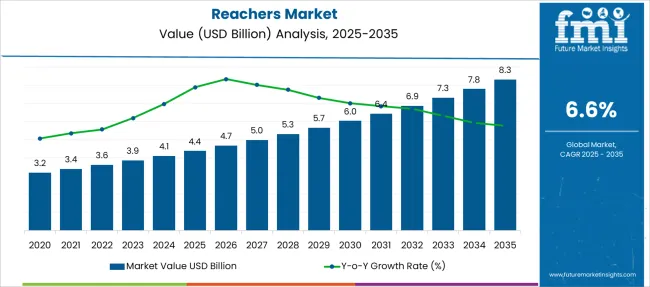
| Metric | Value |
|---|---|
| Reachers Market Estimated Value in (2025 E) | USD 4.4 billion |
| Reachers Market Forecast Value in (2035 F) | USD 8.3 billion |
| Forecast CAGR (2025 to 2035) | 6.6% |
The reachers market is experiencing notable growth driven by the increasing demand for assistive devices among aging populations and individuals with mobility limitations. Rising awareness around independent living and the importance of ergonomic support tools has boosted the adoption of reachers in both healthcare facilities and home care environments.
These devices are being widely used to aid in daily activities such as picking up objects, reducing strain, and minimizing the risk of injury. Technological improvements in lightweight materials, foldable designs, and enhanced grip mechanisms are also enhancing user comfort and expanding product usability.
The market outlook remains positive as healthcare systems continue to promote aging in place strategies and inclusive design solutions to support physical independence and improved quality of life for seniors and individuals recovering from injuries or surgeries.
The market is segmented by Type and Consumer Type and region. By Type, the market is divided into Common Reachers and Folding Reachers. In terms of Consumer Type, the market is classified into Adult and Children. Regionally, the market is classified into North America, Latin America, Western Europe, Eastern Europe, Balkan & Baltic Countries, Russia & Belarus, Central Asia, East Asia, South Asia & Pacific, and the Middle East & Africa.
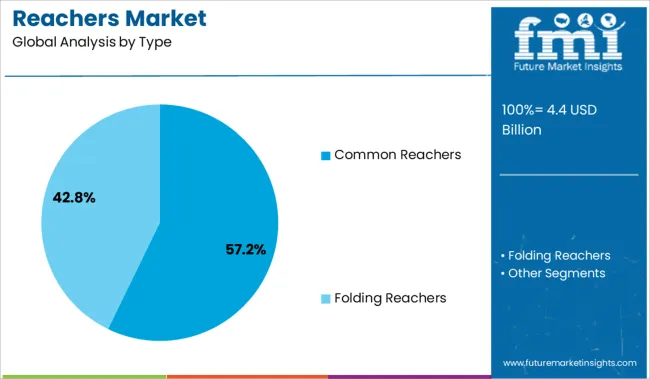
The common reachers segment is expected to contribute 57.20% of the total market revenue by 2025 under the type category, positioning it as the leading product segment. This dominance is attributed to their widespread availability, cost effectiveness, and suitability for a broad range of basic daily tasks.
Common reachers are designed to offer functional versatility and ease of use, which has led to their increased preference in home care and rehabilitation settings. Their utility in enabling users to safely extend their reach without overexertion has been recognized as a major factor in injury prevention, especially for elderly populations.
As demand grows for practical and affordable assistive tools, the adoption of common reachers continues to outpace more specialized alternatives.
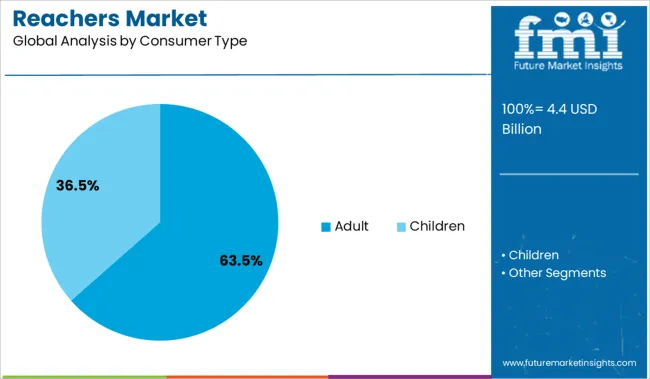
The adult segment is projected to hold 63.50% of the total market revenue by 2025 within the consumer type category, making it the dominant segment. This is primarily due to the rising number of adults experiencing temporary or chronic mobility challenges as a result of aging, injury, or post operative recovery.
The growing aging population globally is driving consistent demand for supportive products that promote autonomy and reduce reliance on caregivers. Adults are increasingly adopting reachers to enhance daily functionality without compromising physical comfort or safety.
Additionally, the integration of ergonomic designs and lightweight materials tailored to adult usage needs has further fueled market penetration. With rising healthcare costs and a strong push for preventive care, adult consumers are emerging as the primary drivers of reacher adoption across multiple care settings.
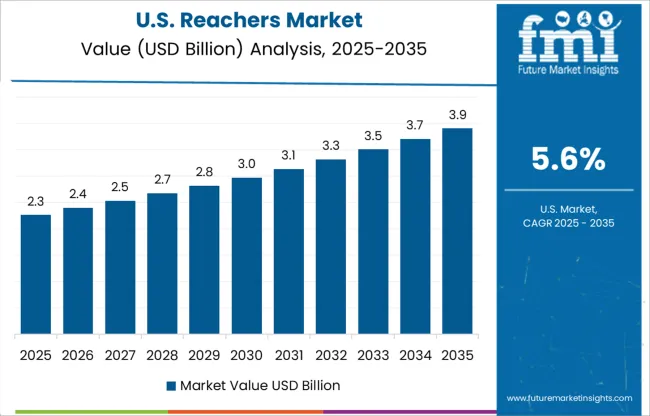
North America now accounts for a sizable portion of the market, and this share is expected to grow in line with the market throughout the forecasted period.
Due to factors such as a growing elderly population, advanced healthcare systems, innovative solutions put forth by industry leaders, and the presence of private organizations providing a wide range of services to assist those who are physically impaired, North America is forecasted to account for a sizable chunk of the global reachers market.
An estimated 4.1 million American adults, or 24 percent of the population, have arthritis, making it a major contributor to work disability, as reported by the Centers for Disease Control and Prevention (CDC) in November 2024. Demand for reachers is being propelled by the high prevalence of arthritis in the USA.
The expansion of the market in North America is expected to be spurred on by increased efforts by major market players to develop novel products, as well as approvals from the Food and Drug Administration (FDA) in the United States. For instance, Samsung Electronics plans to submit their wearable assistive robot, the "GEMS Hip," for FDA clearance in May 2025.
The GEMS Hip acts as an exoskeleton for persons with mobility issues, and it employs an active assist algorithm to enhance gait and muscle movement.
Centers run by the government and commercial groups provide patients with the opportunity to try out various pieces of equipment and receive expert guidance on how to choose the most effective and efficient tools for their impairment. Patients with long-term conditions or impairments do not have to pay value-added tax on mobility aids.
To help their physically challenged citizens acquire such devices, both the United States and the United Kingdom give unique incentives. Some of the many non-profits helping people with disabilities find solutions to their problems are Charity search, the Disabled Information and Advice Lines (DIAL) network, Rica, and Shop mobility.
Priority Assistive Products List is a document released by the World Health Organization (WHO) to describe reimbursement procedures and aid on areas linked to purchasing assistive mobility equipment to ensure that people in need have fair and equal access to these products.
The reachers market is clinging on to the growth of the elderly population. They are also reaping their profits from the surge in the healthcare device markets. Apart from this, the reachers market can witness a considerable hike in the countries which are over populated with expecting women.
According to statistics countries in the African region has highest birth rates. Nigeria is topping the chart with 46.12 percent followed by Mali at 45 percent and a slew of other African countries. As per the report published by UN (United Nations), the elderly population of the world will reach its cusp within the coming few years. This will again beef up the prospects for the reachers market.
Though the development of the reachers market is dependent upon several catalysts but there are multiple blockades which are blocking the advancement of this industry globally. One of the biggest restraint for this industry is the awareness about this tool in the developing markets like India and China, Mexico, Brazil or any other developing nation where the public healthcare system is maimed by foul healthcare strategies.
The government’s apathy towards the research and development of the medical device industry which is spread in these Asian, African or Lain American countries.Developing markets, low public awareness levels, local traders, cheap cloning of several medical tools and devices like reachers are is barricading the headway of the reachers market in these locations of the world.
As discussed earlier the medical device and reachers manufacturers are mostly located in the USA and UK and they are exporting heavily to the third world nations of the world. They are catering their services to the countries like Japan, China, India, and spreading their operations in these markets massively.
The local manufacturers of China and India are also rising the chart with their developing healthcare market. The neighbouring countries like Sri Lanka and Bangladesh and Bhutan are some of the prospective clients of the reachers market based in this parts of the world.
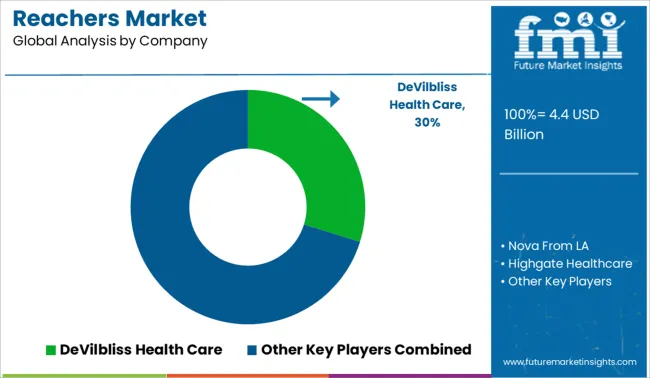
The medical device manufacturing industry is growing at an approximate rate of 9 percent and it has earned a revenue of close to 10 billion. USA is also dominating a considerable amount of the international market. Companies like DeVilbliss health care in USA and Nova from LA, and much more are presently exporting high-end reachers to the international markets.
The research report presents a comprehensive assessment of the market and contains thoughtful insights, facts, historical data, and statistically supported and industry-validated market data. It also contains projections using a suitable set of assumptions and methodologies.
The research report provides analysis and information according to market segments such as geographies, types and applications.
The global reachers market is estimated to be valued at USD 4.4 billion in 2025.
The market size for the reachers market is projected to reach USD 8.3 billion by 2035.
The reachers market is expected to grow at a 6.6% CAGR between 2025 and 2035.
The key product types in reachers market are common reachers and folding reachers.
In terms of consumer type, adult segment to command 63.5% share in the reachers market in 2025.






Our Research Products

The "Full Research Suite" delivers actionable market intel, deep dives on markets or technologies, so clients act faster, cut risk, and unlock growth.

The Leaderboard benchmarks and ranks top vendors, classifying them as Established Leaders, Leading Challengers, or Disruptors & Challengers.

Locates where complements amplify value and substitutes erode it, forecasting net impact by horizon

We deliver granular, decision-grade intel: market sizing, 5-year forecasts, pricing, adoption, usage, revenue, and operational KPIs—plus competitor tracking, regulation, and value chains—across 60 countries broadly.

Spot the shifts before they hit your P&L. We track inflection points, adoption curves, pricing moves, and ecosystem plays to show where demand is heading, why it is changing, and what to do next across high-growth markets and disruptive tech

Real-time reads of user behavior. We track shifting priorities, perceptions of today’s and next-gen services, and provider experience, then pace how fast tech moves from trial to adoption, blending buyer, consumer, and channel inputs with social signals (#WhySwitch, #UX).

Partner with our analyst team to build a custom report designed around your business priorities. From analysing market trends to assessing competitors or crafting bespoke datasets, we tailor insights to your needs.
Supplier Intelligence
Discovery & Profiling
Capacity & Footprint
Performance & Risk
Compliance & Governance
Commercial Readiness
Who Supplies Whom
Scorecards & Shortlists
Playbooks & Docs
Category Intelligence
Definition & Scope
Demand & Use Cases
Cost Drivers
Market Structure
Supply Chain Map
Trade & Policy
Operating Norms
Deliverables
Buyer Intelligence
Account Basics
Spend & Scope
Procurement Model
Vendor Requirements
Terms & Policies
Entry Strategy
Pain Points & Triggers
Outputs
Pricing Analysis
Benchmarks
Trends
Should-Cost
Indexation
Landed Cost
Commercial Terms
Deliverables
Brand Analysis
Positioning & Value Prop
Share & Presence
Customer Evidence
Go-to-Market
Digital & Reputation
Compliance & Trust
KPIs & Gaps
Outputs
Full Research Suite comprises of:
Market outlook & trends analysis
Interviews & case studies
Strategic recommendations
Vendor profiles & capabilities analysis
5-year forecasts
8 regions and 60+ country-level data splits
Market segment data splits
12 months of continuous data updates
DELIVERED AS:
PDF EXCEL ONLINE

Thank you!
You will receive an email from our Business Development Manager. Please be sure to check your SPAM/JUNK folder too.
Chat With
MaRIA